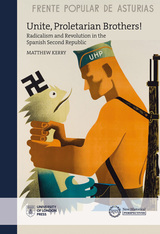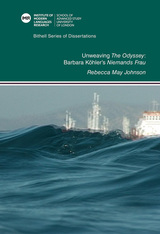223 scholarly books by University of London Press and 4
start with U
223 scholarly books by University of London Press and 4
223 scholarly books by University of London Press
4 start with U start with U
4 start with U start with U

Understanding ALBA
Progress, Problems, and Prospects of Alternative Regionalism in Latin America and the Caribbean
Edited by Asa K. Cusack
University of London Press, 2018
This collection analyses the impact and influence of the Bolivarian Alliance for the Peoples of Our America (ALBA), whose vision of alternative regionalism has spearheaded Latin America and the Caribbean’s collective challenge to neoliberal globalisation in the twenty-first century. The volume’s comprehensive coverage incorporates insights from the domestic level in Nicaragua, the Anglophone Caribbean, and especially Venezuela, while also exploring ALBA’s key regional economic and social-policy initiatives and its place in the wider international relations of Latin American and the Caribbean. Moving beyond normative debates about the project’s desirability and descriptive accounts of its initiatives, this volume provides critical analyses that consider equally ALBA’s progress, problems, and prospects. In tackling many of the key questions about the past and future of ALBA it reveals a frequently misunderstood organisation whose impacts have been significant but whose failings also jeopardise the project’s long-term sustainability. This timely volume helps us to understand the dynamics shaping the region at a time when its global relevance has never been greater.
[more]

Unite, Proletarian Brothers!
Radicalism and Revolution in the Spanish Second Republic
Matthew Kerry
University of London Press, 2020
In October 1934, the northern Spanish region of Asturias was the scene of one of the most important outbursts of revolution in Europe. Thousands of left-wing militants took up arms and fought the Spanish army in the streets of Oviedo, while in the rear-guard committees proclaimed a revolutionary dawn. After two weeks, however, the insurrection was crushed, and the ensuing widespread repression was central to the polarization and fragmentation of Spanish politics prior to the Civil War (1936–39). Weaving together a range of everyday disputes and arenas of conflict, from tenant activism to strikes, boycotts to political violence, Unite, Proletarian Brothers! reveals how local cleavages and conflicts operating within the context of the Spanish Second Republic (1931–36) and interwar Europe explain the origins, development and consequences of the Asturian October. The book sheds new light on the long-debated process of “radicalization” during the Second Republic, as well as the wider questions of protest, revolutionary politics, and social and political conflict in inter-war Europe.
[more]

Unweaving The Odyssey
Barbara Köhler’s Niemands Frau
Rebecca May Johnson
University of London Press, 2019
How has classical literature shaped culture, knowledge, the thinkable? What happens when a canonical text is translated from his gaze into her, and their, gaze(s)? These are some of the questions Barbara Köhler pursues in her modern epic poem, Niemands Frau (2007), her response to The Odyssey. Translated and re-imagined over the centuries, Homer’s tale found critical resonance in intellectual traditions from Christianity through to Post-Colonialism. Odysseus has been viewed as an ideal, reputedly using reason rather than force to dominate, but in Niemands Frau Köhler takes inspiration from Penelope to weave a text that challenges the rationalist and patriarchal epistemological traditions to which the Odyssey contributes. Readers are invited to cast a critical and deconstructive look back as Köhler unweaves histories of misused power and patriarchy and reweaves a critically alert present, gesturing to a future when life is what counts. This study presents the first detailed analysis of Köhler’s poem, tracing the ways in which she re-invents Homer’s text, from the claim that Niemands Frau is a form of ‘translation’ to its complex re-workings of the Homeric figures Penelope, Helen of Troy, Tiresias and Odysseus. Rebecca May Johnson completed her PhD at University College London before joining Newcastle University, where she teaches literature and creative writing and is writing a book of creative non-fiction about gender, cooking and researching food in post-war British women’s writing and cookery books.
[more]

Urban Microcosms 1789-1940
Edited by Margit Dirscherl and Astrid Köhler
University of London Press, 2019
Urban microcosms are small-scale communal spaces that are integral to, or integrated into, city life. Some, such as railway stations or department stores, are typically located in city centres. Others, such as parks, are less quintessentially metropolitan, whilst harbours or beaches are often located on the peripheries of cities or outside them altogether. All are part of a network of nodes establishing connections in and beyond the city. Together, they shape and inflect the infrastructure of modern life. By introducing the concept of urban microcosm into social, cultural, and literary studies, this interdisciplinary volume challenges the widely held assumption that city life is evenly spread across its spaces. Sixteen case studies focus on selected urban microcosms from across Europe between 1789 and 1940, and examine the external appearance, representation, histories, and internal rules of these organizational structures and facilities. In so doing, they contribute to an understanding of modernity, and of the impact of the dynamics of urban life on human experience and intersubjectivity. Margit Dirscherl is Lecturer in German at St Hugh’s, University of Oxford. Astrid Köhler is Professor of German Literature and Comparative Cultural Studies at Queen Mary University of London.
[more]
READERS
Browse our collection.
PUBLISHERS
See BiblioVault's publisher services.
STUDENT SERVICES
Files for college accessibility offices.
UChicago Accessibility Resources
home | accessibility | search | about | contact us
BiblioVault ® 2001 - 2024
The University of Chicago Press









